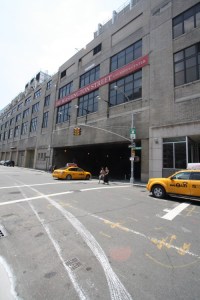Grantland: Will Nonagenarian Eugene Grant Sell 550 Washington Street?
By Daniel Geiger September 18, 2012 7:15 am
reprintsFROM A WAREHOUSE TO OFFICES
By the 1980s, 550 Washington Street’s days as a warehouse facility were over, and Mr. Grant had smartly repositioned it as a low-cost office location, well-suited for financial firms that needed specialized facilities. Though the building didn’t have the traditional look and feel of an office building in, say Midtown, it had other characteristics that made it appealing. The building’s floors, for one thing, had been constructed to bear the tremendous load of freight trains that used to roll into the property, and this industrial-strength infrastructure drew takers. In the 1990s, Merrill Lynch installed massive mainframe computers in a portion of the space.
 “They had worldwide data operations running in that building,” a person who toured the facility during that period recalled. “I remember going in through six layers of security into a hidden chamber that was running 24/7, giant data machines—the holy of holy processing center for Merrill.”
“They had worldwide data operations running in that building,” a person who toured the facility during that period recalled. “I remember going in through six layers of security into a hidden chamber that was running 24/7, giant data machines—the holy of holy processing center for Merrill.”
Bloomberg LP, the financial information, technology and media company, also took space and continues to have a presence in the building. Overall, however, vacancy has grown at the property through the years, to the point where it’s almost fully empty. The building is so big that its empty space ripples through the entire market in that area.
According to statistics kept by Cushman & Wakefield, the commercial office vacancy in Hudson Square is about 14 percent, one of the highest rates in Manhattan. The statistic is inflated heavily by the presence of 550 Washington Street in the data; without the building’s empty space, Cushman economist Ken McCarthy said, vacancy in the area would fall to a much more healthy rate of about 7 percent.
With the rise of areas like Midtown South, 550 Washington Street’s space is perhaps now more attractive than ever before. Deal-making, however, under Mr. Grant’s reign, has become increasingly difficult.
People who know the terms he sets on leasing space say he is unwilling to shell out capital to contribute to the cost of constructing office space for tenants, a concession that landlords market-wide understand is essential to signing a deal. He also frowns upon the cost of having to pay leasing commissions, meaning the brokerage industry, which largely controls where tenants go in Manhattan, have steered clear.
“Gene sees it as ‘why am I going to pay to build out a space or pay a broker if the tenant hasn’t even given me any rent yet?’” a source said.
Mr. Grant, according to those who have dealt personally with him, doesn’t mind if much of 550 Washington Street’s space sits fallow. He owns the property free and clear of any debt, these people say, and there may be tax benefits to owning an asset that throws off little or no income.
“Gene once said ‘there’s nothing wrong with having an empty building,’” a source said. “He’s a stubborn man.”
WESTBROOK TAKEOVER
Westbrook, of course, has much more ambitious visions for the property than merely brightening up its internal spaces to make them more palatable to office tenants. Using once-industrial properties such as Chelsea Market that have been repositioned in successful mixed-use developments as inspiration, the company is exploring options to overhaul the property. One game plan that has been generally discussed is utilizing the building’s air rights and raising a hotel on its north end.
Because the building sits along an increasingly popular West Side waterfront, significant retail in the base could also be installed.
Residential development is also a possibility, although that type of space would require city approval, since the site is not zoned for housing.
Mr. Grant may no longer be able to proudly take suitors for tours of his office palace of yesteryear frozen in time, but a deal with Westbrook will offer him tax relief. If Mr. Grant was to sell his stake in 550 Washington Street today, he would have to pay capital gains taxes on the significant proceeds on that sale. His family would then have to pay taxes yet again on his estate upon his death—effectively being charge twice.
By staying in the deal with Westbrook, his family can avoid capital gains when Mr. Grant passes away, because tax law nullifies those charges if they are incurred while generating proceeds to pay an estate tax.
dgeiger@observer.com


